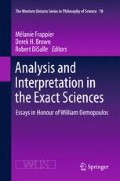Abstract
It is often claimed that the geodesic principle can be recovered as a theorem in general relativity. Indeed, it is claimed that it is a consequence of Einstein’s equation (via the conservation principle that is, itself, a consequence of that equation). These claims are certainly correct, but it may be worth drawing attention to one small qualification. Though the geodesic principle can be recovered as theorem in general relativity, it is not a consequence of Einstein’s equation (or the conservation principle) alone. Other assumptions are needed to drive the theorems in question. My goal in this short note is to make this claim precise.
Access this chapter
Tax calculation will be finalised at checkout
Purchases are for personal use only
Notes
- 1.
- 2.
All the material in the section is perfectly standard except for one small bit of ad hoc terminology. In addition to the weak and dominant energy conditions, we will consider something that we call the “strengthened dominant energy condition.”
- 3.
This is not a standard name.
- 4.
If λ a is a smooth spacelike field, then \(T_{ab} = \lambda _a \lambda _b\) satisfies the weak, but not the dominant, energy condition. Similarly, if λ a is a smooth, non-vanishing null field, then \(T_{ab} = \lambda _a \lambda_b\) satisfies the dominant, but not the strengthened dominant, energy condition.
- 5.
Let \(\gamma :\;I \to M\) be a smooth curve. We say that a point p in M is a future-endpoint of γ if, for all open sets O containing p, there exists an s 0 in I such that for all \(s \in I\), if \(s \ge s_0\), then \({{\upgamma} \left(\textrm{s}\right)} \in O\), i.e. the image of γ eventually enters and remains in O. (Past-endpoints are defined similarly.)
- 6.
For a proof, see Hawking and Ellis (1972, p. 94).
- 7.
See, for example, proposition 1.7.11 in Malament (2012).
References
Ehlers, J., and R. Geroch. 2004. Equation of motion of small bodies in relativity. Annals of Physics 309(1): 232–236.
Geroch, R., and P.S. Jang. 1975. Motion of a body in general relativity. Journal of Mathematical Physics 16(1): 65–67.
Hawking, S.W., and G.F.R. Ellis. 1972. The large scale structure of space-time. Cambridge: Cambridge University Press.
Malament, D. 2012. Topics in the foundations of general relativity and Newtonian gravitation theory. Chicago: University of Chicago Press.
Taub, A.H. 1962. On Thomas’ result concerning the geodesic hypothesis. Proceedings of the National Academy of Sciences 48(9): 1570–1571.
Thomas, T.Y. 1962. On the geodesic hypothesis in the theory of gravitation. Proceedings of the National Academy of Sciences 48(9): 1567–1569.
Wald, R.M. 1984. General relativity. Chicago: University of Chicago Press.
Acknowledgements
I am grateful to Robert Geroch for giving me the basic idea for the counterexample (Proposition 3) that is the principal point of interest in this note. Thanks also to Harvey Brown, Erik Curiel, John Earman, David Garfinkle, John Manchak, Wayne Myrvold, John Norton, and Jim Weatherall for comments on an earlier draft.
Author information
Authors and Affiliations
Corresponding author
Editor information
Editors and Affiliations
Rights and permissions
Copyright information
© 2012 Springer Science+Business Media B.V.
About this chapter
Cite this chapter
Malament, D.B. (2012). A Remark About the “Geodesic Principle” in General Relativity. In: Frappier, M., Brown, D., DiSalle, R. (eds) Analysis and Interpretation in the Exact Sciences. The Western Ontario Series in Philosophy of Science, vol 78. Springer, Dordrecht. https://doi.org/10.1007/978-94-007-2582-9_14
Download citation
DOI: https://doi.org/10.1007/978-94-007-2582-9_14
Published:
Publisher Name: Springer, Dordrecht
Print ISBN: 978-94-007-2581-2
Online ISBN: 978-94-007-2582-9
eBook Packages: Humanities, Social Sciences and LawPhilosophy and Religion (R0)

